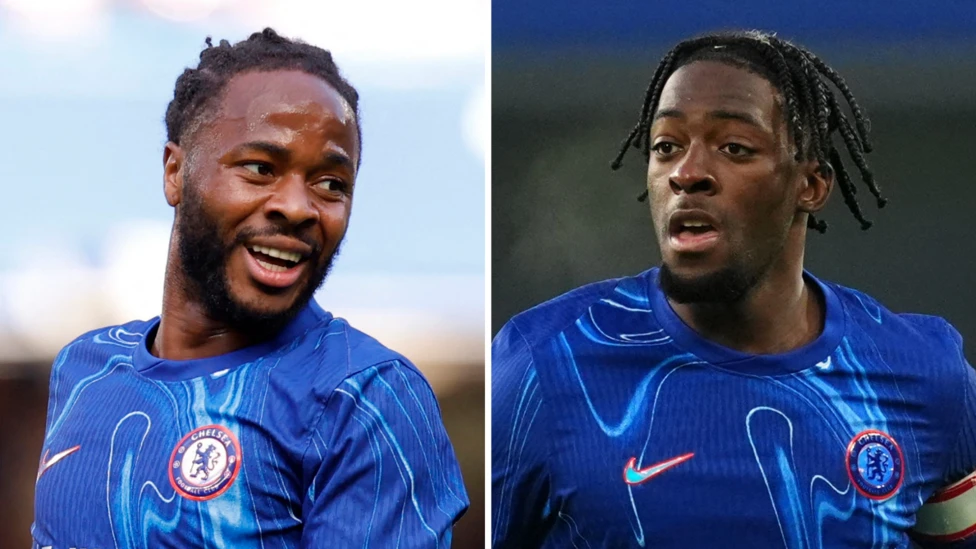The Professional Footballers’ Association (PFA) has entered discussions with Chelsea over the treatment of Raheem Sterling and Axel Disasi, two high-profile players currently frozen out of the club’s first-team set-up.
Both players, once key figures in Chelsea’s squad, now find themselves sidelined under head coach Enzo Maresca, who has made it clear they are not part of his immediate plans. As things stand, Sterling and Disasi are training away from the main group, sparking concerns from the players’ union over whether their professional rights are being fully respected.
Sterling and Disasi in Limbo
Sterling, 30, remains one of the highest-paid players at the club, earning approximately £325,000 per week, with just under two years left on his current deal. Disasi, 27, signed a long-term contract upon his arrival from Monaco in 2023, tying him to Stamford Bridge until 2029.
Last season, both players spent time away from the club on loan—Sterling at Arsenal and Disasi at Aston Villa. Their temporary moves were widely seen as the first step towards permanent exits. However, with the summer transfer window closing without deals being struck, both players remain at Chelsea but face limited prospects of featuring in competitive matches before January.
The situation has raised alarm bells, not only among supporters but also within the PFA, which is seeking to ensure that neither player is unfairly denied the chance to train and maintain peak fitness.
PFA Seeks Assurances
The PFA’s involvement reflects growing concerns about how clubs manage players who are deemed surplus to requirements. According to sources, the union has reminded Chelsea of FIFA’s strict regulations concerning the isolation of players.
FIFA rules make clear that preventing professionals from training at an adequate level may constitute “abusive conduct” by the employer. Such circumstances could potentially provide players with “just cause” to terminate their contracts, a situation that would prove costly for a club, particularly given the lucrative nature of Sterling’s deal and the length of Disasi’s.
The PFA’s intervention appears aimed at ensuring that Chelsea avoids any scenario where the players’ legal rights could be infringed, while also safeguarding the principle that professionals must be allowed to train in conditions that enable them to perform at the highest level.
Chelsea’s dilemma
For Chelsea, the situation represents an increasingly common dilemma in modern football: how to manage high-earning players who no longer fit into a manager’s vision. Under Maresca, who is implementing a more youthful and tactically distinct approach, both Sterling and Disasi have been deemed expendable.
Yet the club’s inability to secure permanent transfers or suitable loan arrangements has left them with expensive squad members on the sidelines. Keeping such players away from the first team reduces dressing room tension, but it also risks regulatory scrutiny and potential financial consequences.
Wider implications
The cases of Sterling and Disasi highlight a growing tension between players’ rights and clubs’ strategic decisions. While clubs must balance competitiveness and squad harmony, FIFA and the PFA stress the need for fair treatment and professional standards.
In recent years, football has witnessed several high-profile disputes involving players isolated from squads, often leading to legal battles or premature contract terminations. The PFA’s swift move to step in suggests it is keen to avoid a similar scenario unfolding at Stamford Bridge.
What next?
Both players are expected to reconsider their futures when the January transfer window opens. Sterling, still an England international with a wealth of Premier League experience, is likely to attract interest from clubs across Europe. Disasi, meanwhile, remains a player of considerable potential, particularly valued in the French market.
Until then, the focus will be on ensuring the duo continues to train at an elite level, even away from Chelsea’s first team. Whether that arrangement satisfies FIFA’s requirements remains to be seen.
Chelsea and the PFA have both been approached for comment, but neither has issued a formal statement at this stage.
What is clear, however, is that the union’s involvement has placed pressure on Chelsea to ensure the treatment of Sterling and Disasi aligns with international regulations and basic professional standards.
For Sterling and Disasi, the months ahead could prove decisive, not only for their careers but also in setting a precedent for how out-of-favour players are treated in the Premier League era.



